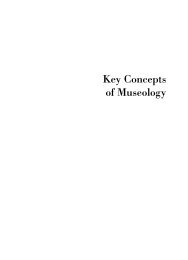ISS 25 (1995).pdf - The International Council of Museums
ISS 25 (1995).pdf - The International Council of Museums
ISS 25 (1995).pdf - The International Council of Museums
You also want an ePaper? Increase the reach of your titles
YUMPU automatically turns print PDFs into web optimized ePapers that Google loves.
continent, but where the feeling <strong>of</strong> national identity is not a questionable<br />
idea. As an emerging nation in the arena <strong>of</strong> economical growth, Brazil<br />
faces today another kind <strong>of</strong> warfare: the problem <strong>of</strong> Power is not a<br />
question <strong>of</strong> political boundaries and territories, it is a problem <strong>of</strong> social<br />
boundaries and <strong>of</strong> the ownership <strong>of</strong> land and wealth. <strong>The</strong> unbalance <strong>of</strong><br />
Power is at the basis <strong>of</strong> social struggle, <strong>of</strong> death, corruption and<br />
destruction <strong>of</strong> human values, in the core <strong>of</strong> Brazilian nationality. Three<br />
case studies may be presented in order to approach the problem <strong>of</strong><br />
museums and museology, and their roles and relationships with different<br />
communities, in different situations. In only one <strong>of</strong> these cases, there is a<br />
Museum: a community based museum. In the two other cases, there are<br />
no museums at stake, but no more than potato fields, a big river, and<br />
what I would call an experiment <strong>of</strong> "popular museology", if one may<br />
consider this possibility .. .<br />
Not by coincidence, the three cases take place in the southern region <strong>of</strong><br />
the country, in an area <strong>of</strong> great rural properties and <strong>of</strong> small agricultural<br />
farms, <strong>of</strong> highly developed industrial plants concentrated around rich<br />
urban centres, <strong>of</strong> fast growing towns and <strong>of</strong> thousands <strong>of</strong> villages and<br />
rural nuclei spread along the vast territory <strong>of</strong> fields and mountains. It is<br />
not difficult to imagine the variety and the strength <strong>of</strong> social contrasts<br />
one can find there (as in many other regions <strong>of</strong> Brazil). <strong>The</strong> great<br />
majority <strong>of</strong> the population in this area has an European origin, chiefly<br />
German and Italian, constituting the third or fourth generation <strong>of</strong><br />
descendants <strong>of</strong> the immigrants who came to this country since the second<br />
half <strong>of</strong> the 19th century until early this century. <strong>The</strong> problem <strong>of</strong> identity<br />
is a major point in the development <strong>of</strong> these communities, having still<br />
strong links with their cultural roots but already merged in what we<br />
could call the Brazilian cultural melting pot, and environment. In the last<br />
8 years, I had the opportunity to work as a consultant and a partner in<br />
three projects that may be seen as "case studies" for the discussion <strong>of</strong> the<br />
role <strong>of</strong> museums and <strong>of</strong> cultural heritage in the life <strong>of</strong> people and <strong>of</strong> their<br />
communities.<br />
1. <strong>The</strong> "Schmitt-Presser" House<br />
<strong>The</strong> place is New Hamburg, a rich town growing fast with the industry <strong>of</strong><br />
shoes production, exported all over the world. From its name one can<br />
easily know the cultural origins <strong>of</strong> its population (around 300 thousand<br />
people). After years <strong>of</strong> decay, an old house in the oldest quarter <strong>of</strong> the<br />
town, the "Old Hamburg", has been restored by the local authorities and<br />
protected under the list <strong>of</strong> national monuments, as a true example <strong>of</strong> the<br />
46
















